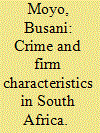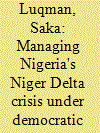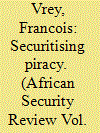| Srl | Item |
| 1 |
ID:
107325


|
|
|
|
|
| Publication |
2011.
|
| Summary/Abstract |
This study sought to investigate the impact of firm and non-firm characteristics on crime incidence in South Africa using a Probit model and 2007 data from World Bank enterprise surveys. Results show that the firm characteristics in the country that increase the likelihood of being subjected to crime is the size of the firm, ownership structure (foreign or locally owned), and market orientation. Small firms appear to be more vulnerable to criminal attack, probably because they lack resources to invest in quality security systems. The study also found that firms that are foreign owned and are involved in export experience less incidence of crime compared to others. This can be partly attributed to the fact that most of these outward-oriented or foreign-owned firms are relatively large in size and are thus able to spend more on security systems that are effective in detecting and deterring crime. There is therefore a need for government, together with the business community, to come up with affordable but effective security measures to assist small establishments, locally owned and inward-oriented firms to detect and combat crime. This would lead to greater industrial growth, investment promotion and employment creation.
|
|
|
|
|
|
|
|
|
|
|
|
|
|
|
|
| 2 |
ID:
107326


|
|
|
|
|
| Publication |
2011.
|
| Summary/Abstract |
Since the return to civil rule, the Niger Delta has witnessed increasing dissent in the form of an armed insurgency with the attendant criminal activities. The Nigerian state has sought to manage the region's crisis using both conciliatory and militarist approaches with little success. Drawing insights from in-depth interviews, newspaper interviews, commentaries and editorials, this article assesses the utility of military deployment in containing the crisis. While recognising the need for securing oil installations, the scale of avoidable civilian casualties raises questions about the utility of military engagement in managing the Niger Delta crisis.
|
|
|
|
|
|
|
|
|
|
|
|
|
|
|
|
| 3 |
ID:
107328


|
|
|
|
|
| Publication |
2011.
|
| Summary/Abstract |
Piracy forms part of a wider array of maritime threats and vulnerabilities that are seeping into the African security landscape. While landward peacekeeping by the United Nations (UN) and other regional organisations dominates the literature - particularly with regard to Africa - piracy has become a maritime threat that has drawn significant international attention since 2007 and has become the object of international securitisation activities. Securitisation as speech acts by interested parties articulating the threats piracy hold, communication of the threat to several audiences and calling for their support and actions, as well as responses by member states, galvanised international cooperation against piracy off the Somali coast. By 2008 the UN played a prominent role in the securitisation process by creating a more conducive operating environment against piracy through four UN Security Council resolutions. The deployment of scarce naval platforms by member states in response to the UN call for action poses the question of whether a UN maritime mission is taking shape off the Horn of Africa. However, the naval response serves both UN peace support activities in the Horn of Africa and significant national and other economic interests. It appears that the naval cooperation off the Horn does not reflect an emergent UN maritime mission in support of the Somali debacle, but the question of an emergent UN maritime mission does offer fertile ground for further research.
|
|
|
|
|
|
|
|
|
|
|
|
|
|
|
|
| 4 |
ID:
107327


|
|
|
|
|
| Publication |
2011.
|
| Summary/Abstract |
The election of Sheik Sharif Sheik Ahmed as the transitional president of Somalia was the climax of the United Nations (UN)-led Djibouti peace process. The election, it was hoped, would herald the beginning of the reconstitution of the Somalian state. Unfortunately, nearly three years after the event, that has still not happened. The government of Sheik Sharif has faced a number of challenges which are yet to be resolved. In the end, the Djibouti peace process has not guaranteed a stable and functional national government in Somalia.
|
|
|
|
|
|
|
|
|
|
|
|
|
|
|
|
| 5 |
ID:
107324


|
|
|
|
|
| Publication |
2011.
|
| Summary/Abstract |
Political violence, at times perceived as terrorism, remains a major security challenge in Swaziland. The common view is that this violence is perpetrated by those who feel marginalised from the political process. Central to the hypothesis advanced in this paper is that any effective solution to the menace of political violence and the security challenges it poses begins with an awareness of the symbiotic relation between security, human rights and democracy. It has been empirically proven that abuse of human rights can lead to violence, which negates peace and security in any society. In terms of content the paper looks at the shape of political violence in Swaziland. Next, it discusses the strategies and ideas behind efforts by the Swazi state to combat political violence and the counter-arguments. The final section shows the inextricable link between security, human rights and democracy; and argues that recognising this linkage can provide the key to unlocking the security puzzle in Swaziland.
|
|
|
|
|
|
|
|
|
|
|
|
|
|
|
|